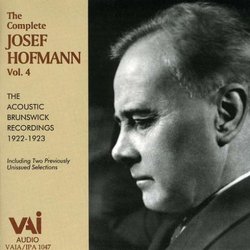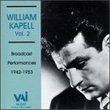| All Artists: Carl Tausig, Johannes Brahms, Anton Rubinstein, Josef Hofmann, Sergey Rachmaninov, Louis Brassin, Frederic Chopin, Franz Liszt Title: Josef Hofmann, Vol. 4 Members Wishing: 0 Total Copies: 0 Label: Video Artists Int'l Release Date: 6/2/1995 Genres: Dance & Electronic, Special Interest, Classical Styles: Marches, Chamber Music, Forms & Genres, Short Forms, Historical Periods, Classical (c.1770-1830), Modern, 20th, & 21st Century Number of Discs: 1 SwapaCD Credits: 1 UPC: 089948104728 |
Search - Carl Tausig, Johannes Brahms, Anton Rubinstein :: Josef Hofmann, Vol. 4
 | Carl Tausig, Johannes Brahms, Anton Rubinstein Josef Hofmann, Vol. 4 Genres: Dance & Electronic, Special Interest, Classical
|
Larger Image |
CD DetailsSimilar CDs |
CD ReviewsJosef Hofmann: Wonderful playing, a little surface noise Richard Mathisen | Ambler, PA USA | 03/15/2000 (5 out of 5 stars) "Volume 4 is a single CD containing recordings of Josef Hofmann from 1922-23 known as the Acoustic Brunswicks. The surface noise is much better than Volume 3, but these are still a little noisy. This is Hofmann in his prime, about age 46. The playing is delectable, as always with Hofmann. It is again Hofmann in the shorter pieces -- a nice selection without much duplication. My assumption is that anyone interested in Hofmann will start by getting Volumes 1 & 2 -- the Chopin Concertos and the 1937 Golden Jubilee Recital. Beyond that, in choosing among Volumes 3 to 6, Volume 4 probably the best choice, if you can take a little surface noise. (Otherwise, Volume 5 would be my suggestion.)" Which Hofmann? John Atherton | CINCINNATI, OHIO United States | 09/06/2004 (4 out of 5 stars) "Hofmann - particularly late Hofmann - may be an acquired taste.
Despite having been the protégé of Anton Rubinstein, "the wonderful boy" was recognized from quite an early age as the exemplar of a modern style of playing - textually faithful, eschewing swooning or bombast. (See, for example, the references to Hofmann in Henry Lahee's wonderful survey from 1900, Famous Pianists of Today and Yesterday.) Still, a number of younger colleagues expressed ambivalence. Horowitz was floored by Hofmann's keyboard command - everyone was - but he, Artur Rubinstein and Arrau, to name just three - seem not to have been terribly moved by Hofmann's musicianship. But which Hofmann are we considering? His playing for the gramophone - as early as 1903 and as late as 1935 - was as disciplined as it was imaginative and dazzling. The late Harold Schonberg called it "perfection plus." However, as Gregor Benko makes clear in his essays for the Marston reissues, Hofmann switched on what the pianist called a "spectacular" style for many public performances. This may sound cynical. Often it sounds terribly cynical. Hofmann was not speaking merely of the need to project in a large concert hall. In public performance - at least those performances we have from the late `30s and early `40s - the aristocrat often becomes a mountebank, lurching from the softest pianissimos to explosive fortissimos, rattling off passages or entire pieces even faster than Simon Barere boasted he could do. Schonberg - and Hofmann's friend and admirer Rachmaninoff - reminded us that during this period Hofmann had many personal troubles, including a severe drinking problem. We must believe that at his greatest Hofmann played as scrupulously and with as much refined feeling in public as he did on many of his studio recordings, though his manner may have differed somewhat. And there are some marvelous live performances. The Rubinstein 4th from his Golden Jubilee concert beggars description. So where does that leave us? As an introduction to Hofmann, I would recommend the early Columbia recordings, those he made somewhat later for Brunswick, and the American and British test pressings from 1935 - perhaps his greatest recorded playing. These are Volumes 3, 4 and 5 of the complete Hofmann series. Serious listeners will also want the ups and downs of the Golden Jubilee (Volume 2). The Chopin concertos in Volume 1 have some splendid moments, but the superlative (not spectacular; superlative) performance there is a fragment of the first movement of the E minor concerto performed in London -- far more poised and committed than its counterpart from New York. (I wonder if Hofmann played differently in America than he did in Europe? Some musicians - for instance, Mahler, Toscanini, Bernstein - for varying reasons apparently did.) Having said all this, the entire Hofmann series is priceless. Heartfelt thanks to Gregor Benko and Ward Marston for making it available in superb transfers with fascinating notes." |

 Track Listings (17) - Disc #1
Track Listings (17) - Disc #1


